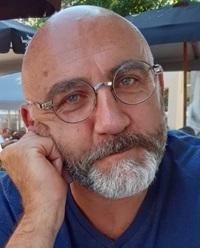Christopher
CARCAILLET
Prof. Chris Carcaillet graduated in Master in Land Management from the Univ. of Rennes 1 (France, 1992), a PhD in Ecology from Aix-Marseille university (France, 1996), and a Habilitation from the University Paul Sabatier (Toulouse, France, 2001). He was post-doctoral scientist at the Dept of Geography of the Univ. of Montréal, Canada (1997-98), at the Univ. of Québec at Montréal (1999) and, research fellow at the Swedish Univ. of Agricultural Sciences (Umeå, 1999-2001). He became Professor in 2001 at the Ecole Pratique des Hautes Etudes (EPHE, Paris) at the Dept of Life and Earth sciences. He was Director of the Center for Bio-Archaeology and Ecology (CNRS, EPHE & Univ. of Montpellier, France) from 2003 to 2010. In 2007, he founded the Paleoenvironments and Chronoecology lab (EPHE, France). He has been associated professor at the Dept of Biology of the Univ. of Québec at Montréal where he was visiting researcher at the Center for forest studies in 2011-12. From 2010 to 2014, he was head of the joint international research unit MONTABOR (CNRS & Univ. of Quebec). Chris Carcaillet is currently researcher at the Lab for Ecology of Natural and Anthropic Hydrosystems at the University of Lyon, France.
Christopher Carcaillet study the influences of climate and social processes on the pattern of plant communities or ecosystems in space and time. His main research focuses on the ecology of past fire in relation to climatic changes and plant diversity dynamics in boreal, mountain and Mediterranean areas. Since few years, he is also studying the interactions between snow avalanches or insect diseases with socio-ecological systems. He is also concerned by the role of fires on the global carbon budget, notably through the release of carbon to the atmosphere, and the long-term sequestration of black carbon in soil.
Écologie : communautés, socio-écosystèmes, paysages
Responsable formation
Ecologie & Société
Responsable formation
Ecologie forestière pratique
Responsable formation
